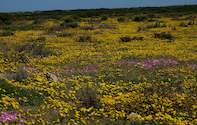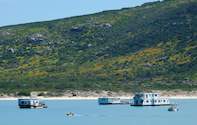
Access
The West Coast National Park is located just off of the R27, 120 kilometres (74.4 miles) north of Cape Town. The gates open at 07h00 daily and close at 18h00 in winter and 19h00 in summer.
Airport
The closest airport to the West Coast National Park is Cape Town International Airport. Visitors can fly into Cape Town and then take a leisurely 1.5 hour drive on well tarred roads to the nature reserve.
Internal Road Network
There is approximately 80 kilometres (49.6 miles) of internal road network within the reserve, 50 kilometres (31 miles) of which is tarred.
Highlights
The West Coast National Park has the Atlantic Ocean as its western boundary with the coastal towns of Saldanha and Langebaan a short distance away. The reserve is known as one of the finest coastal wetland areas in South Africa and has an extremely rich bird life and a high diversity of fynbos and other plant species. The restaurant at Geelbek is a popular stop, offering delicious light meals made from traditional local recipes.

Activities
The bird hides at Seeburg, Abrhamskraal and Geelbek are all fantastic locations to enjoy some bird watching. There is also a restaurant and information centre at Geelbek. Visitors to the nature reserve can also explore the park on a number of different mountain biking and cycling routes or on one of the hiking trails that start at the Geelbek visitors centre. There are two circular walking trails, one7 kilometres (4.34 miles) and one 9 kilometres (5.58 miles) that take one past the dunes and the 7 kilometre one also goes across a section of the beach.
There are also a number of full day and two day hiking trails. Between August and November visitors to the reserve may be lucky enough to spot Whales along the coastline. The Postberg area of the reserve is well known for the beautiful blankets of flowers that cover the area between August and September and guests can also enjoy some game viewing in that section of the park.
The Experience
With the Langebaan lagoon as the focal point of the reserve, visitors are met with magnificent views of azure waters, flourishing wetlands, pristine beaches and beautiful flatlands. Wandering along the beaches in the early morning when the mists are still rising and the thousands of birds on the nearby rocks and islands are still waking up, is a treat. The joyful, vibrant, colourful display of flowers in spring is something not to be missed, while the game viewing in the Postberg section of the reserve can also be highly rewarding.

Accommodation
Visitors to the park can choose to stay at a number of different West Coast National Park accommodation options including moored houseboats, self-catering cottages, chalets and beach cottages.
Climate
The West Coast National Park is situated in a semi-arid, Mediterranean climate with most of the rainfall occurring during the winter months. Summer and autumn sees heavy fog which also contributes to the precipitation. The area is known for frequent strong south-easterly winds in summer and north-easterly winds in winter. Maximum and minimum temperatures range from 27.5°C (81.5°F) in summer to 15°C (59°F) in winter. Evenings in winter can be cold with temperatures dropping to 7°C (44.6°F) and below.
Useful Information
Overnight stay and day visitors are welcome to the reserve. Visitors staying overnight need to check in at 12h00 and no late arrivals are allowed. There are fuel stations in the park as well as in the nearby towns. Visitors are welcome to bring their own food and refreshments with them or they can purchase them from the kiosk at Postberg, when it is open or at the Geelbek Restaurant.
Visitors swimming in the lagoon should be aware of the currents on both sides of Schaapen Island as these are known to be strong and can change direction very suddenly. The nature reserve and its surrounding area is a crayfish and abalone reserve and visitors are advised to never remove these creatures from their habitat. Poaching of these organisms is a punishable offence. Certain activities such as walking, cycling and water sports are restricted to specific areas and visitors are asked to always adhere to these sections.

 Just a 1.5-hour drive from the city of Cape Town, the West Coast National Park is a rugged wilderness gem nestled along the West Coast regio...
Just a 1.5-hour drive from the city of Cape Town, the West Coast National Park is a rugged wilderness gem nestled along the West Coast regio... The West Coast National Park is famous for its many spring flowers and excellent pelagic birding. However, it is home to many marine species...
The West Coast National Park is famous for its many spring flowers and excellent pelagic birding. However, it is home to many marine species...